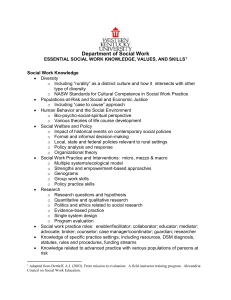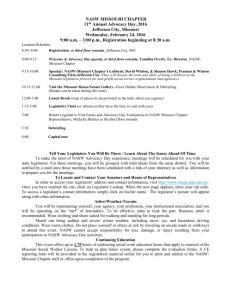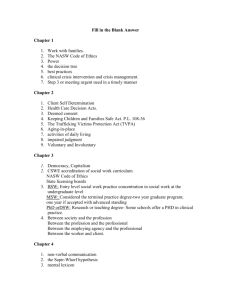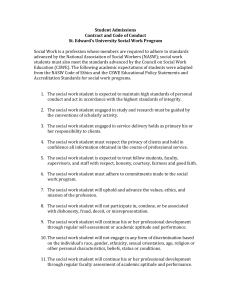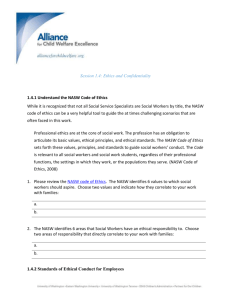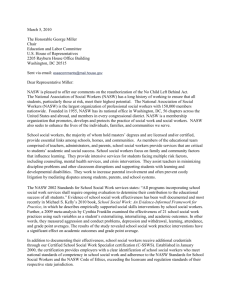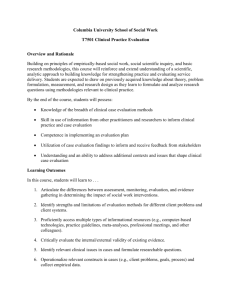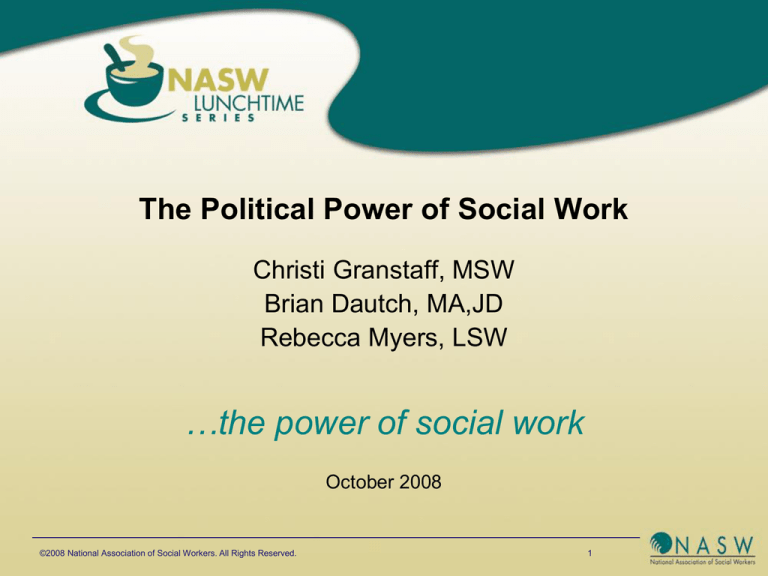
The Political Power of Social Work
Christi Granstaff, MSW
Brian Dautch, MA,JD
Rebecca Myers, LSW
…the power of social work
October 2008
©2008 National Association of Social Workers. All Rights Reserved.
1
Political Social Work
Defined
Macro practice that relates to government,
especially the conduct of government, the making
of governmental policy and running for and
holding elected office.
©2008 National Association of Social Workers. All Rights Reserved.
2
Settings for Political
Social Work
Elected office: local, state and national
• Local party, school board, council, mayor, county,
controller
• State legislature, governor
• Congress, president
Example: Rebecca Myers, School Board
Settings and Roles
Political Campaigns
• Local, state and national
• Campaign organizer/manager
• Policy staff for campaign
Settings and Roles
Advocacy / Lobbying Organizations
•
•
•
•
Non-profit and for profit
Issue specific or industry/profession specific
Lobbying/advocacy staff
Field organizer
Example: Christi Granstaff, Deputy Director, Tennessee Primary Care
Association
Settings and Roles
Staff for Elected Officials
• Constituent services
• Policy staff
• Issue area staff
Example: Valerie Grasso, MSW, Congressional Research Service
Settings and Roles
Political Appointments: Volunteer and Paid
• Volunteer committees
• Cabinet positions
• Government agency appointments
Example: Alexis Herman, Secretary of Labor
Skills Needed
Knowledge of Direct Social Work Service:
• Provides an important contribution to the political
environment
• Enhances our skills as political social workers
• Creates and advocates for effective policies for clients,
social workers, and agencies
Skills Needed
• A survey of social workers serving in elected
office demonstrates that most of the 12 skill areas
identified in NASW’s standards for the
classification of social work practice apply to
political social work.
Skills Needed
• Keeping current about issues
• Responding to the demands and needs of
constituencies
• Social workers in political office have little trouble
with these skills because of their social work
training. (Haynes & Mikelson, 2005)
Skills Needed
•
•
•
•
•
“People” skills of listening, responding,
persuading, and caring
Political skills of linking, brokering, and
advocacy
Ability to consider alternative solutions
Consensus building
Negotiation and mediation
Skills Needed
For working With Constituents:
•
•
•
•
•
Navigating government agencies and services
Completing short term and task-centered activities
Assisting people with accessing benefits and services
Resolving disputes between people and agencies
Creating a group to identify and address common needs
or issues
Challenges
• Employer confusion
• Difficulty in raising funds for elective office
• Inability to take time off to run for office
(Haynes & Mikelson, 2006)
Too many decisions are made affecting the
clients we serve to leave it only to non-social
workers. So few come with our background,
and there are many who just don’t grasp the
approach of problem solving or understand
human behavior.
Maine social worker and member of the legislature
(Haynes & Mikelson, 2005)
Political Social Work as a Tool for Every Practice
•
•
•
Ethical mandate
Skills needed
Examples
©2008 National Association of Social Workers. All Rights Reserved.
15
Ethical Mandate
• Political social workers are held to the same
values and ethics as other social workers
• Code of Ethics of the National Association of
Social Workers
Ethical Mandate
NASW Code of Ethics
Section 6 – Ethical Responsibility to Society
Social Workers Should Engage in Social and Political Action
seek to ensure that all people have equal access to the
resources, employment, services, and opportunities they
require to meet their basic human needs and to develop fully.
Ethical Mandate
NASW Code of Ethics
Section 6 – Ethical Responsibility to Society
Social Workers Should Be Aware of the Impact of the
Political Arena on Practice
advocate for changes in policy and legislation to improve
social conditions in order to meet basic human needs and
promote social justice
©2008 National Association of Social Workers. All Rights Reserved.
18
Ethical Mandate
• Pursue social change
• Focus on issues of social injustice
• Promote sensitivity about oppression and cultural and
ethnic diversity
• Ensure access to information, services, and resources;
equality of opportunity; and meaningful participation in
decision making
Skills for Political
Advocacy
• Data collection and research
• Public relations and media
• People skills, especially persuading, negotiating,
mediating, accommodating, and educating
• Knowledge of regulatory, legislative, or
organizational process
©2008 National Association of Social Workers. All Rights Reserved.
20
Skills for Political
Advocacy
•
•
•
•
Fundraising
Networking and Alliance Building
Use of Technology
Organizing
(Gibelman, 2004)
©2008 National Association of Social Workers. All Rights Reserved.
21
Examples
• Clinical social workers helping clients to advocate
for change
• Influencing policy through the power of personal
stories
• Providing expert testimony to legislative
committees
• Personal advocacy on professional and social
issues
©2008 National Association of Social Workers. All Rights Reserved.
22
Tools and Resources
•
•
•
Organizing tools (Legislative Advocacy listserv
and CapWiz, website, text messages)
Elections and campaigns (PACE)
What’s happening now
Organizing Tools
•
•
•
•
Advocacy listserv
Web-based mobilization vehicle (CapWiz)
Website
Focused campaigns
“New Technologies”
©2008 National Association of Social Workers. All Rights Reserved.
25
Elections and Campaigns
NASW Political Action for Candidate Election
(PACE)
Established by NASW in 1976
GOAL: To pool money from members to support
and elect politicians aligned with social
work issues and values
Elections and Campaigns
NASW Political Action for Candidate Election
(PACE)
• In 1994, NASW made a commitment to elect
more social workers to public office and to
increase electoral advocacy
• A dues check-off was created to fund both
national and chapter political action committees
Elections and Campaigns
NASW Political Action for Candidate Election
(PACE)
• National and state chapters have focused efforts on
educating social workers about the political process, how
to run for office and how to be involved in political
campaigns
• Currently 48 chapters have an established PACE.
• In the 2006 federal elections, NASW provided nearly
$450,000 and endorsed 224 candidates for Congress.
Elections and Campaigns
NASW Political Action for Candidate Election
(PACE)
• 9 social workers in Congress – 2 in the Senate, and 7 in
the House
• 192 social workers holding elective office
• 37 social workers practicing in legislative offices in the US
Congress
Elections and Campaigns
NASW Political Action for Candidate Election
(PACE)
Importance of Participation in PACE
• Dues check off ~ national & state contribution
• Additional giving opportunities
• Service on PACE Committee
What’s Happening
Now?
•
•
•
•
Field mobilization
Voter registration
Get Out the Vote (GOTV)
Position statements

